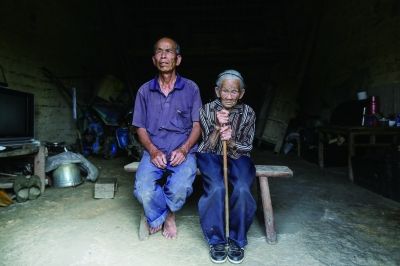'Comfort woman' recounts 70 years of hardship
- By Li Jingrong
 0 Comment(s)
0 Comment(s) Print
Print E-mail China.org.cn, July 16, 2015
E-mail China.org.cn, July 16, 2015
Wei Shaolan, 95, and her son, whose father is Japanese, have had only each other for company, sharing hardships for over 70 years.
 |
|
Wei Shaolan, 95, and her son Luo Shanxue, whose father is Japanese, have had only each other for company, sharing hardships for over 70 years. |
Recollections of the painful past
Wei Shaolan was born in 1920 in Guidong Village, Xinping Town, Lipu County, Guangxi Zhuang Autonomous Region. In 1944, the Japanese army ransacked Guidong Village. Wei tried to run away with her baby daughter, but was captured and forced to become a sex slave for Japanese soldiers, ignoring the fact she was then a nursing mother. Her baby daughter later died of illness.
In the following three months, Wei suffered repeated gang rapes by Japanese soldiers and soon became pregnant with a child. She didn't realize she was pregnant until she managed to flee the Japanese brothel and rejoin her husband.
Wei didn't want to keep the child, but warned by her mother-in-law who had some medical knowledge that she might become infertile, she gave up the ideal of having an abortion.
Wei gave birth to her son Luo Shanxue in the summer of 1945. She later had another two children -- a daughter and a son -- with her husband, but she and the first son fell into the long, shameful and tragic abyss of dishonor. The scale of their hardships is beyond imagination.
Luo only attended school for three years due to poor family conditions and the stigma of having Japanese blood in his veins. "When I was little and herding cattle in the fields, people would say to my face 'You are a Jap boy'," he recalled.
Luo never married. He lives with his mother raising chickens and cows and selling herbal medicines in the local area. "None of the women I met wanted to be with me once they found out about my origins," he said.
Wei's husband died 40 years ago, and she has since lived alone with her son. Her son said that because of his Japanese blood there is a feeling of estrangement between him and his mother that is difficult to express. Although they live together, they seldom talk to each other.
Speaking of his Japanese father, Luo is filled with hatred. "He didn't support me. To me he is a beast. My life-long sufferings were caused by this beast." However, he added: "I am very grateful to my stepfather, although he let me have three years of schooling. There was no way out at that time."
The long road to claiming damages
After World War II, the Chinese government renounced any claims to war reparations from Japan, but allowed individual Chinese victims to seek compensation. Since 1995, former Chinese "comfort women" have filed lawsuits against the Japanese government, but Japanese courts have repeatedly ruled the government is not liable for compensation.
Wei and her son also took action. "The Japanese military hurt my mother and caused misery to all of us. They have to apologize," Luo said.
"I hated my life and thought my mother should never have let me be born. I carried a lot of anger inside me. However, now I understand what she has suffered, and I want to stand beside her and fight for justice".
In December 2010, the pair, with the help of Zhu Hong, a television worker living in Japan, traveled to attend an activity commemorating the 10th anniversary of the Women's International War Crimes Tribunal in Tokyo.
Wei delivered a petition to the Japanese parliament, demanding that Japan face its historical crimes objectively and the suffering she and her son experienced and sincerely apologize and offer compensation. They toured Tokyo, Shizuoka, Kyoto and Osaka to denounce the crimes of the Japanese invaders by revealing their own painful experience.
The wish to achieve justice
Wei and her son still lead a poor life in the small village in Lipu County, Guangxi. Their only source of income is a living allowance of less than 700 yuan a month from the government and some irregular donations from social organizations.
Wei suffers from rheumatic heart disease and liver cancer. She mostly sits on an old sofa in the shabby house left by her husband. Her son raises cows and chickens. Every day, they look at each other in silence.
Wei's last wish in her remaining years is to gain justice from the Japanese government.
Su Zhiliang, director of the China Research Center on Chinese "comfort women" at Shanghai Normal University, has extensively researched the topic.
The "comfort women" who survived the war have not had an easy life. "Many are looked down upon. Some became infertile. Others refused to marry because of their bad memories," he said.






Go to Forum >>0 Comment(s)